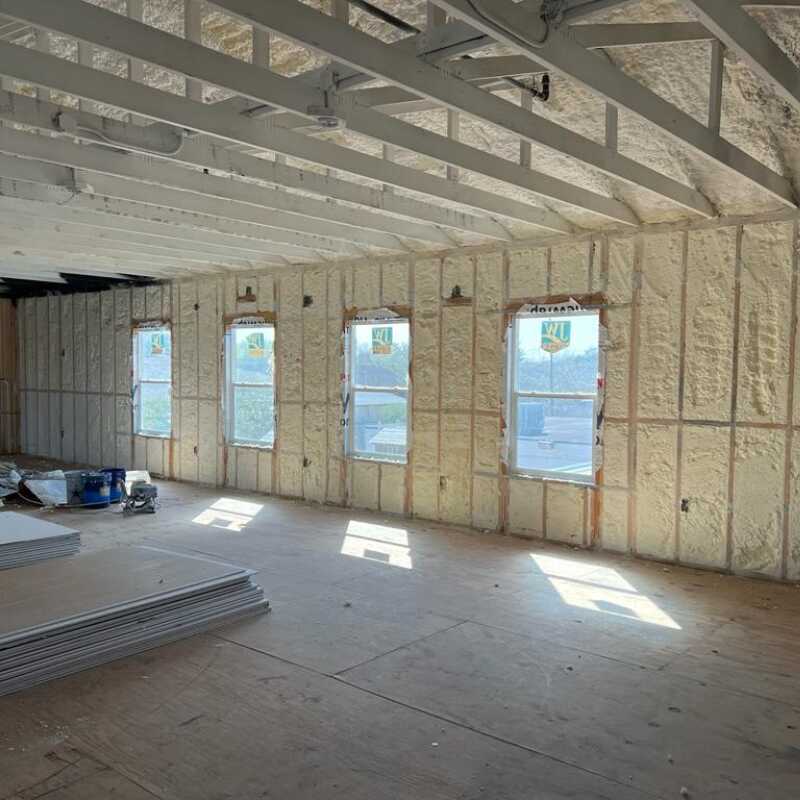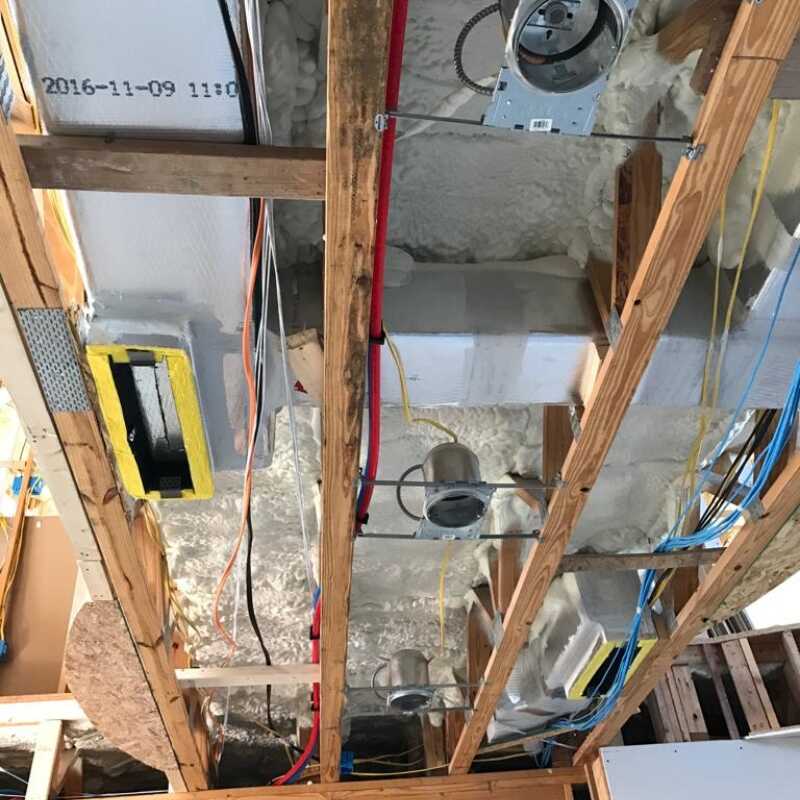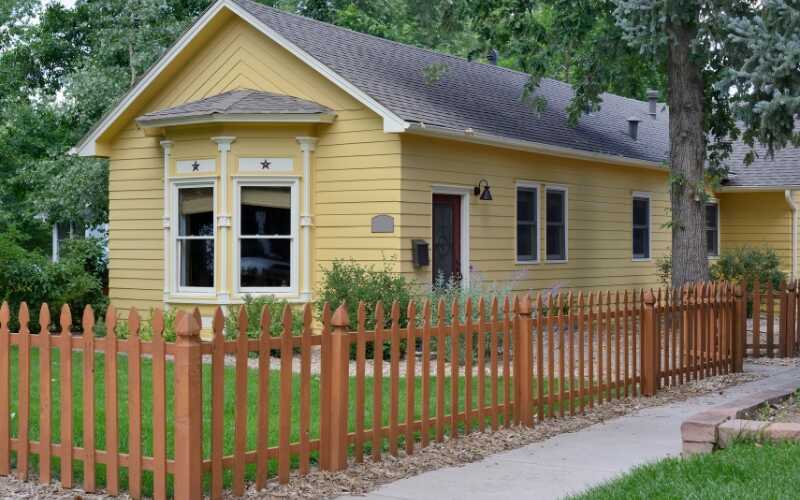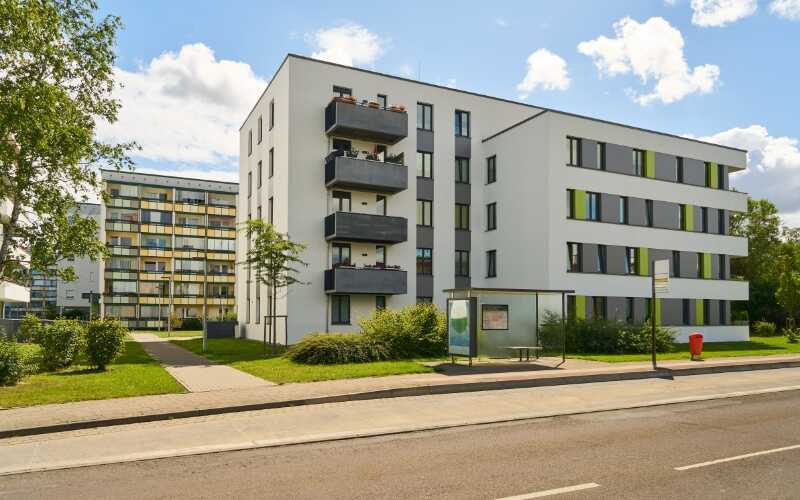The Inflation Reduction Act
Learn everything you need to know about the Inflation Reduction Act and how it impacts your household.
What is the Inflation Reduction Act?

The Inflation Reduction Act (IRA) was signed into law on August 16 as a 10-year plan. This act allocates new funds to rebate programs and funding mechanisms to support efficiency improvements.
As a result, homeowners have an excellent opportunity to increase their return on investment for energy efficiency upgrades throughout their homes.
What Does This Means for Insulation & Homeowners?
Additionally, one of the most significant benefits of this bill is its emphasis on encouraging eco-friendly products and services and supporting clean energy production.
In this way, the IRA is a robust support system for homeowners seeking to improve their homes’ energy efficiency.

Energy Efficient Home Improvement Credit

The Energy Efficient Home Improvement Credit is an excellent opportunity for homeowners to claim tax credits on specific energy-efficient home and appliance upgrades.
Starting in 2023, homeowners can claim 30% of the cost of energy-saving installations, such as insulation, windows, doors, and other building changes.
This new credit system improved over the previous one, which had a $ 500-lifetime limit.
In contrast, the updated design includes a $1,200 annual limit and changes to annual limits for specific qualifying improvements.
As a result, homeowners now have a more significant opportunity to benefit from energy-efficient upgrades and progress in their homes.
The HOMES (Home Owner Managing Energy Savings) Rebate Program
This Program is an excellent opportunity for homeowners to reduce their overall energy use and earn cash back by making energy-efficient home improvements. First, an energy audit is conducted using DOE-approved software to determine the projected (modeled) savings based on your energy use and household income. This information is used to determine the rebate amount you receive. The Program offers three rebate amounts, depending on the modeled energy savings.
Measured Energy Savings
< 20%
Modeled Energy Savings
20%-35%
Modeled Energy Savings
> 35%
High-Efficiency Electric Home Rebate Program

The High-Efficiency Electric Home Rebate Program is an excellent initiative encouraging low- and middle-income families to make environmentally friendly choices.
Specifically, the Program offers rebates for certain purchases made within the HOMES program.
If you want to qualify for these discounts, your total annual income must be at least 150% of the median income for your area. You can use energy-efficient renovations and appliance rebates if you meet this requirement.
For example, if you purchase insulation, air sealing, and ventilation, your household can receive up to $1,600 in refunds.
However, it’s essential to remember that there are limits and additional qualifications to consider before starting a significant home improvement project.
Overall, the High-Efficiency Electric Home Rebate Program is an excellent option for families looking to improve the energy efficiency of their homes while also saving money.
Single-Family Homes

Several opportunities are available for individuals and single-family homeowners to save money on energy-efficient upgrades.
First, it’s worth noting that noncommercial homes qualify for the Energy Efficient Home Improvement Credit, regardless of whether you’re renting or living in a multifamily building.
Another program to consider is the HOMES Rebate Program, which offers cashback through energy-efficient renovations like insulation and efficient appliances based on how much you save.
Finally, the High-Efficiency Electric Home Rebate Act is available only to low- to medium-income families.
This Program offers rebates for certain purchases made within the HOMES program, specifically aimed at encouraging environmentally friendly choices.
Many options are available for homeowners looking to improve their home’s energy efficiency and save money.
Multifamily Homes

The Inflation Reduction Act (IRA) presents several opportunities for multifamily development. Specifically, a $1 billion HUD-led program provides loans and grants for improving energy and water efficiency.
This Program can help relieve utility bills and enhance climate disaster preparedness, especially in low-income communities.
Another program to consider is the Green and Resilient Retrofit Program, which combines direct loan subsidies and competitive grants to support improvements made to multifamily properties.
Overall, these programs are an excellent way to promote energy efficiency and sustainability in multifamily developments.
How Can I Qualify?
Suppose you’re looking to qualify for tax credits for home improvements starting in 2023. In that case, several resources are available to help you get started. One of the best places to start is by contacting your State Energy Office, which can provide valuable information on when specific incentives will be offered and supported in 2023. With their help, you can take full advantage of the available tax credits and significantly improve your home while saving money.
Inflation Reduction Act FAQs
When does the IRA go into effect?
In August 2022, the IRA bill was enacted, but its different parts have varying deadlines. To begin with, starting January 1, 2023, almost all home improvement projects (except for specific appliances like water heaters) will be eligible for the Energy Efficient Home Improvement credit. Furthermore, the HOMES Rebate Program and the High-Efficiency Electric Home Rebate Act, which are part of the Program, are expected to begin in 2023 and continue until September 20, 2031. However, it is essential to note that since individual states run these programs, their start times may vary. In addition, it’s worth mentioning that some state-specific incentive programs will continue to receive funding throughout this period.
How can my home Benefit from the IRA and credits from insulation?
Improving your home’s insulation has several benefits. For one, it can reduce energy bills, increase efficiency, and improve comfort and indoor air quality. Additionally, you can take advantage of tax credits and rebates to lower the costs of these upgrades and improve your home’s energy efficiency.
How does the IRA focus on environmental impact?
The IRA focuses on reducing the environmental impact of the commercial and residential sectors, which accounted for 13% to 25% of greenhouse gas emissions in 2020, depending on the source. To achieve this goal, the Act aims to reduce pollution by 40% by 2023. It incentivizes property owners to make energy-efficient improvements through rebates and tax credits.
How do i know if my state offers additional rebates?
To determine if your state offers additional rebates, you can use the ENERGY STAR Rebate Finder Tool by entering your zip code. It’s important to note that each state has rebate programs to help lower the cost of specific home improvements. If you want insulation rebates in your area, you can filter the search results to “Sealing and Insulation Products.”
Do i need to wait until 2023 to make home improvements for the IRA?
You can make home improvements and benefit from the IRA in 2023. Although the New Energy Efficient Home Tax Credit expired in December 2021, the IRA extended the Program until December 2022. It means you can still earn credits for qualified improvements made in 2022. Furthermore, tax credits and incentives may already be available in your state. You can check the DSIRE database for residential tax credits and rebate information to find out what’s available in your area.
Is the IRA available to all homeowners and landlords?
The IRA is available to homeowners, landlords, and single- and multifamily home renters. It means that anyone can take advantage of the benefits offered by the HOMES rebate program, regardless of income. However, it’s important to note that the High-Efficiency Electric Home Rebate Act within the Program is designed specifically for low- to medium-income families based on the area’s median income.
Can i claim a tax credit under the IRA?
The answer is yes if you can claim a tax credit under the IRA. You can do so by investing in energy efficiency and renewable energy. Various home improvements that reduce energy use and emissions from a building will qualify for tax credits under the IRA. You can use a calculator to find out how much you’ll save with the tax credit.
